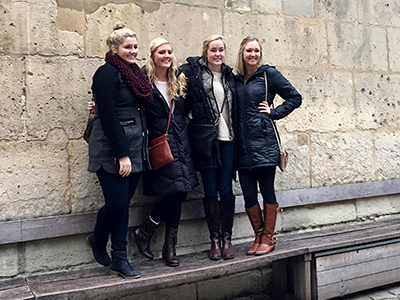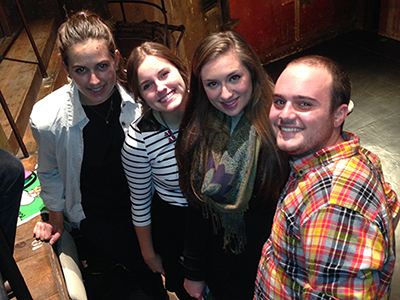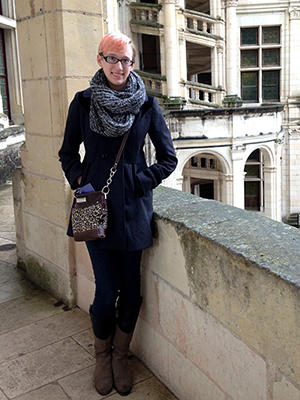CAS students grow from experiencing liberte firsthand in the City of Light

Charlie Hebdo attacks bring a sense of sorrow and unity to the Paris: Cultural Capital study abroad program
Written by Jason Barone, CAS Director of Communications

Olivia Vandervort (2nd from right) and friends in front of the Musée de Cluny
"We didn't know what to think or how to act at first," said Olivia Vandervoort, a sophomore political science major, remembering the morning of January 7, when 12 people were murdered at the Paris offices of a satirical newspaper. "It was very sad and confusing at the same time."
Olivia and 17 other Miami students were in Paris during Winter Term 2015 participating in the Paris: Cultural Capital winter workshop. The 3-week program in Paris was designed to "allow students to discover the cultural and historical significance of Paris from the cathedrals of the Middle Ages to the contemporary metropolis beloved by artists, writers, and filmmakers from France and America," said Associate Professor of French Elisabeth Hodges, who organized the program with Associate Professor of English Kathleen Johnson.
Using the city as "a kind of experiential laboratory," according to Johnson, students read and retraced the steps of Ernest Hemingway, Gertrude Stein, F. Scott Fitzgerald, Pablo Picasso, and others who lived and worked for a time in the City of Light. The Miami group learned about significant moments in the history of French cultural production and visited iconic landmarks such as Versailles Palace, the Louvre, the Musée d'Orsay, the châteaux of the Loire Valley, and many more.

Kendra Huspaska (2nd from right) and friends in Paris
Midway through, however, the entire world changed.
"All over the news, they were talking about how this was their 9/11," said Kendra Huspaska, a sophomore graphic design major. She recalled being put under 24-hour lockdown in their residence shortly after class ended, despite plans to visit Notre-Dame Cathedral and embark on a river cruise of the Seine later that day. "The hardest part was realizing later that our parents were all so worried. We were fine, though, and we never really felt unsafe."
Sara Schindler, a senior linguistics major who speaks French, was already waiting at Notre-Dame with a few other students when the reports came in. "I got a call from Professor Hodges, saying, 'Don't panic, but there's been a shooting, and we need you to get back to the student center right now,'" she said. "We hurried and grabbed a taxi."
"I told the students, 'Here you are in the vortex of history,'" Johnson said. "This is the cultural moment that we are in, and to their credit, the students really wrestled with a lot of issues, finally arriving to a strong sense of compassion for the city of Paris and all of the French people. I was moved by their decisions to stay and continue their studies as planned."

Sara Schindler in front of the Chenonceau
"While they were unnerved, the students made the choice to learn as much as they could about the context of the situation, to learn about the longstanding tradition of political satire in France and of one of the most precious rights for the French, the right to freedom of expression," said Hodges. "The radical social critique that began in the early 19th century made Charlie Hebdo both famous and, regrettably, a target."
When they were given the all-clear to walk the city streets again, the students instantly could see that things were different. "There were French soldiers all around the city carrying these huge guns," Kendra said. "That was something that you don't normally see, but the way the Parisians acted so calmly really helped. We didn't have to feel afraid."
Wishing to show their solidarity with the French, many members of the group participated in the Unity March the following Sunday, in which over 4 million people marched through the streets from the Arc de Triomphe to the Bastille.
"When we took the metro to the end of the line that day, we found the station was packed wall-to-wall with people," said Olivia. "In a way, this summed it all up for us, changing our experience from scary to cool, something we could learn from."
"The attack was a tragic and terrifying event, but I was honored to be a part of it afterward," said Sara. "Honestly, I felt like a temporary Parisian, and I was so glad I could be there for that."
"We were united with the French people because we were there when it happened," Kendra added. "I think the experience will stay with me forever, and our group will always have a connection with the French people because of this."

